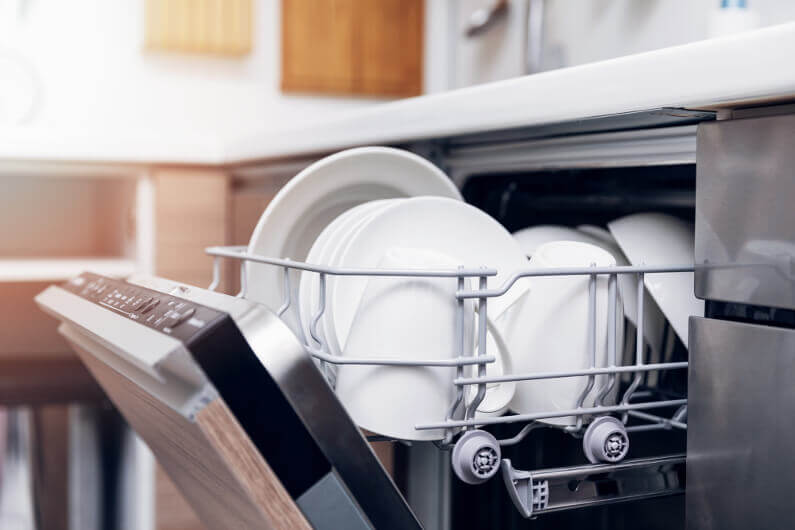Call This Monday to Get $50 OFF
Call This Monday to Get $50 OFF
Call This Monday to Get $50 OFF
Call This Monday to Get $50 OFF
Frustrating and inconvenient having a dishwasher that won't drain is often frustrating and inconvenient. It can disrupt your daily schedule and leave your sink filled with dirty water, making it difficult for you to clean properly. There could be many potential reasons why your dishwasher won't drain. We will outline five common causes and possible solutions; if this issue arises again, it would be wiser to contact us at High Speed Plumbing to avoid further complications. Our plumbing service can recommend appropriate solutions for your specific dishwasher concern.

Clogged air gaps may be to blame for your dishwasher's drainage woes. An air gap is a small device on either your countertop or sink rim designed to stop dirty water from flooding back into the machine, thus helping prevent its return into your dishwashing cycle. Over time, debris and buildup may accumulate in your air gap and block water flow resulting in standing water in your dishwasher. Drain cleaning may be required to address and resolve this issue. High Speed Plumbing can easily unclog your air gap, eliminating obstructions and restoring the proper functioning of your dishwasher's drainage system. By addressing clogged air gaps, you can ensure your dishwasher drains effectively while preventing further drainage problems.
A kinked drain hose can often be the source of dishwasher drainage issues. Over time, its construction may become twisted or bent, restricting water flow. Inspect your drain hose carefully for any signs of compression or kinking; straighten any bends or loops for proper drainage if any bends appear; if the hose becomes damaged, it may need replacing altogether.
One of the primary causes of the dishwasher not draining properly is clogging itself. Food particles, grease, and soap scum build up over time can clog the drainage system and prevent proper functioning. First, inspect your filter at the bottom of your machine; remove any build-up blocking water flow. Next, check and clean spray arms thoroughly so they are unobstructed; finally, run an additional cycle with a dishwasher cleaner for additional help with stubborn residue build-up.
The drain basket, commonly called the sump, is at the bottom of your dishwasher. It collects larger food particles that would otherwise clog the drain; however, if this becomes full or blocked, it can prevent proper drainage and performance of your dishwasher. Therefore it is necessary to take steps to restore proper functioning if it becomes full or blocked - for this purpose, simply removing and thoroughly cleaning out the basket is required to eliminate buildup - rinse under running water with a brush attachment for stubborn residue before reinserting securely back in its secure home for optimal performance!
Believe it or not, using too much detergent can contribute to a dishwasher drainage issue. Overdoing it with soap will lead to excess suds that cause the machine to overflow and not drain correctly. Always follow manufacturer recommendations regarding soap usage; add rinse aid if possible to improve performance further. If you suspect too much soap has been used at once, run an empty cycle without dishes or detergent to clear away any extra residue that has built up in the machine.
If you're hearing a rumbling sound from your basement, don't ignore it. At High Speed Plumbing, we've seen everything from thermostat…
Running out of hot water at your business can mean angry customers, health code violations, or a full operational shutdown. Restaurants,…
Are you dealing with a leaky faucet, low water pressure, or a broken handle? If so, you might need a faucet…
A properly working garbage disposal makes kitchen cleanup easy and efficient. If your disposal is acting up—making loud noises, leaking, or…
When your main water line has a problem, it can cause a lot of trouble for your home. Leaks, low water…
Are you dealing with an old, leaky, or broken toilet? If so, it may be time for a toilet replacement in…
If you’re concerned about the quality of your water, water filtration installation in Pomona is a wise choice. A good filter…
Traditional snaking or chemical drain cleaners can harm pipes and aren’t always effective at reaching deep blockages…
While troubleshooting can often solve dishwasher drainage issues independently, sometimes professional help may be required to remedy a stubborn one. Call High Speed Plumbing if all recommended solutions have failed and your dishwasher still needs to drain after following them all. We have access to professional tools that allow them to diagnose and resolve complex drainage problems efficiently. Our expertise will enable them to identify underlying issues and develop effective solutions so your dishwasher runs efficiently.